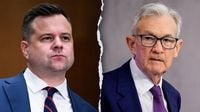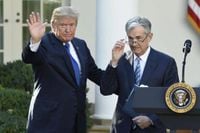Washington, D.C. is abuzz with speculation after William J. Pulte, Chairman of the Board of Fannie Mae and Freddie Mac, publicly expressed encouragement over reports that Federal Reserve Chair Jerome Powell is considering resigning. On July 11, 2025, Pulte stated, "I’m encouraged by reports that Jerome Powell is considering resigning. I think this will be the right decision for America, and the economy will boom." This statement has added fuel to an already tense atmosphere surrounding Powell's leadership amid mounting political pressure.
Pulte, who also serves as Director of the Federal Housing Finance Agency (FHFA), has been a vocal critic of Powell since his confirmation in March 2025. The FHFA oversees Fannie Mae, Freddie Mac, and the 11 Federal Home Loan Banks, government-sponsored enterprises that collectively provide over $8.5 trillion in funding for the U.S. mortgage markets and financial institutions. His criticism has largely centered on Powell's handling of monetary policy, particularly the Federal Reserve's decision to maintain interest rates at a steady level.
Since late May 2025, Pulte has repeatedly called on Powell to lower interest rates, arguing that the housing market would benefit significantly from such a move. In mid-June, after the Federal Reserve held the benchmark federal funds rate steady for the fourth consecutive meeting, Pulte escalated his demands, publicly calling for Powell's resignation. He has also urged Congress to investigate Powell over allegations of political bias and deceptive testimony, asserting that these issues could warrant removal "for cause."
Adding to the controversy, Pulte accused Powell of mismanaging the Federal Reserve's headquarters renovation project in Washington, D.C., labeling it "nothing short of malfeasance." The renovation, initially estimated at $1.9 billion in 2019, has ballooned to nearly $2.5 billion due to rising costs of materials such as wood, steel, and cement. The project has drawn criticism for its perceived extravagance, with Republican policy advocate and former Office of Management and Budget Director Russell Vought describing it as an "ostentatious overhaul" featuring alleged rooftop terrace gardens, VIP dining rooms, premium marble, and other luxury elements.
During a Senate Banking Committee hearing in June 2025, Powell defended the project, dismissing many of the allegations as "misleading and inaccurate." He clarified, "There is no new marble, aside from replacement of damaged parts. There are no rooftop gardens, no special elevators, no new water features. All of the inflammatory things reported in the media are either not in the current plan or just inaccurate." Despite these assertions, Vought's letter to the Federal Reserve raised concerns that the project may be out of compliance with the approved design plans and federal regulations requiring oversight by the National Capital Planning Commission (NCPC).
The Federal Reserve operates with a degree of independence from the executive branch, including the authority to renovate its facilities. However, the dispute over the renovation has reignited debate over the limits of this autonomy and whether political pressure is encroaching on central bank operations. The Office of Management and Budget echoed Vought's concerns on social media, alleging that Powell "slipped up and revealed he might... be violating the law." The Senate Banking Committee has since announced plans for a staff briefing on the matter.
Meanwhile, President Donald Trump, who appointed Powell as Fed Chair in 2017, has been an outspoken critic of his leadership. Trump has repeatedly called for Powell to cut interest rates and has publicly weighed firing him, despite federal law stipulating that a Fed Chair can only be removed "for cause." Trump has labeled Powell a "numbskull" and suggested he "maybe" would attempt to remove him from office. Trump's budget chief, Russell Vought, echoed these sentiments in his letter, stating, "The President is extremely troubled by your management of the Federal Reserve System. Instead of attempting to right the Fed’s fiscal ship, you have plowed ahead with an ostentatious overhaul of your Washington D.C. headquarters."
The tension extends beyond the Federal Reserve. On the same day as Pulte's statement, reports surfaced about FBI Deputy Director Dan Bongino considering resignation amid internal clashes between the FBI and the Justice Department over the fallout from the Epstein files. Sources cited by CNN revealed that Bongino, along with Pam Bondi, FBI Director Kash Patel, and White House Chief of Staff Susie Wiles, were confronted in a meeting regarding allegations that the FBI wanted more information released but was blocked by the DOJ. Axios reported that Bongino did not show up for work on July 11, highlighting the turmoil within federal agencies.
Financial markets have been closely watching these developments. The Federal Reserve has kept interest rates unchanged for several months in the 4.25%-4.5% range. Analysts suggest that if the Fed were to lower rates later this year, it could trigger significant inflows into various markets, including the booming cryptocurrency sector. Bitcoin, for instance, has been on a historic bull run, surpassing the $112,000 mark on July 10 and reaching an all-time high of $118,856.47 on July 11. At the time of reporting, Bitcoin was trading at $117,931.85, with the overall crypto market capitalization standing at $3.7 trillion. Trump has lauded this surge, attributing it to his tariff policies and reiterating his call for the Fed to cut rates to "reflect this strength."
Despite the swirling rumors and political pressure, the Federal Reserve has maintained a cautious stance. A Fed spokesperson declined to comment on Pulte's statement about Powell's potential resignation but noted that Powell has consistently expressed his intention to serve out his full term as Chair, which ends on May 15, 2026. His term as a member of the Federal Reserve Board extends until January 31, 2028, though he has not indicated whether he plans to continue in that capacity after his chairmanship.
If Powell does decide to step down amid these pressures, it would mark a rare and significant shift in the leadership of the Federal Reserve. Such a move could have profound implications for U.S. monetary policy, inflation control efforts, and the broader economic outlook. For now, the nation watches closely as political, financial, and institutional tensions converge in the nation's capital.


